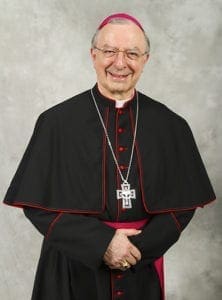Knowing the treasure of God’s word
By BISHOP JOEL M. KONZEN, S.M. | Published January 20, 2022 | En Español

Bishop Joel M. Konzen, S.M.
The three Atlanta bishops recently joined other bishops of the Southeast on our annual retreat. The retreat master was Father Simeon Leiva-Merikakis, a Trappist of St. Joseph’s Abbey in Massachusetts. Father Simeon has written a number of books and translations, most notably his four-volume commentary on the Gospel of Matthew. It was no surprise, then, that he turned to that Gospel for the topic of his conferences. More surprising, maybe, was his decision to concentrate on just one chapter in Matthew for the whole week of presentations.
The result of spending many hours on a single Gospel chapter is a reminder of the richness of sacred Scripture that is unearthed when we take the time to go deeply into the Word of God with a desire for no less than knowing the mind of God. While we will never completely know the mind of God, we give him thanks for revealing so much through his son and through the inspired writings of the entire Bible. We have to be grateful, likewise, that the four Gospel writers recorded what they did, upon which so much of our Catholic teaching and liturgy is based. Indeed, when we say that we know Jesus Christ, we admit that we know him chiefly through the way that he is portrayed in the Gospels, as well as by partaking of his Body and Blood in the Eucharist.
People sometimes undertake the reading of the whole Bible. Most who do that report that it was a valuable and formative experience for them. But the typical Bible reader is more likely to approach it in the course of a Bible study, or to clarify something heard in a homily, or to read a limited amount each morning or evening. It is becoming more popular today for people to use the method known as Lectio Divina, which started long ago with St. Benedict. In Lectio Divina, a person reads a passage of Scripture and then meditates for a time on the passage. After meditating, the reader prays about what the passage is suggesting for one’s life and activity, and finally he or she contemplates in silence the union shared with God as a result of the truth that the passage has revealed in divine love. This practice does not approach the passage in a scholarly way as much as it seeks to aid in a person’s prayer and spiritual progress springing from the Word of God.
It is always a good time to commit to reading the Bible in any method or sequence that will likely be continued. Maybe you do want to take up the Lectio Divina method, using the readings from each day’s liturgy, or maybe you want to concentrate on the readings that will be used in the coming Sunday’s Mass. There are guides that can lead you through excerpts from the Bible at a pace that will suit your available time and interest.
Most of us can name favorite songs or movies when asked. People who have delved into the Bible can usually also name their favorite sections or phrases that speak to them particularly. Over the years, I have jotted my favorite passages in the front pages of my oldest Bible. I do go back to these when I am meditating in the morning or when I am praying in front of the Blessed Sacrament. These are the quotations from Jesus, from St. Paul, the Psalms and elsewhere that most moved me and which motivate me still in a variety of ways. Some people have marked up their Bibles with margin notes over the years with insights that they want to recall.
Our Catholic understanding is based equally on Scripture and tradition, which is why we do well to come to know and love the sacred Word of God. Pray to the Holy Spirit to know the best way to become increasingly familiar with the treasure that we have in God’s revealed word.